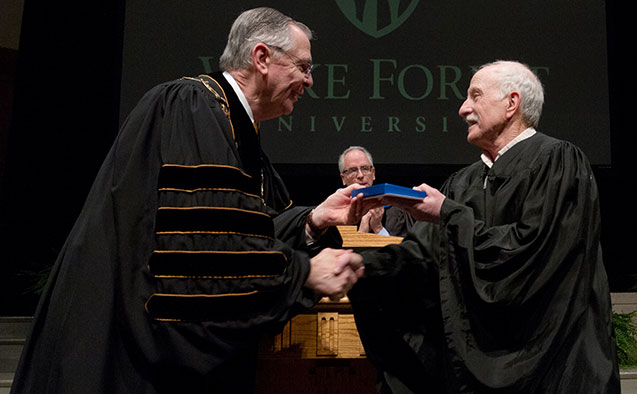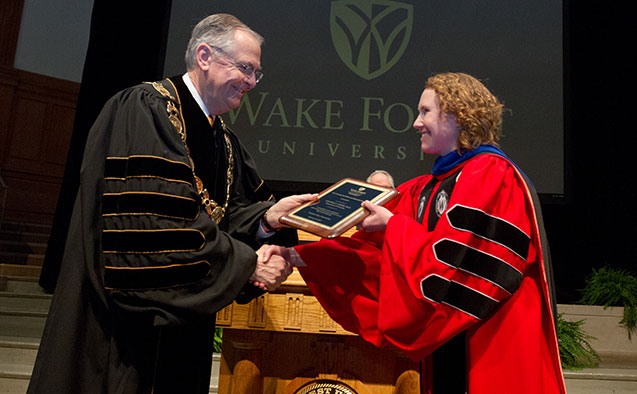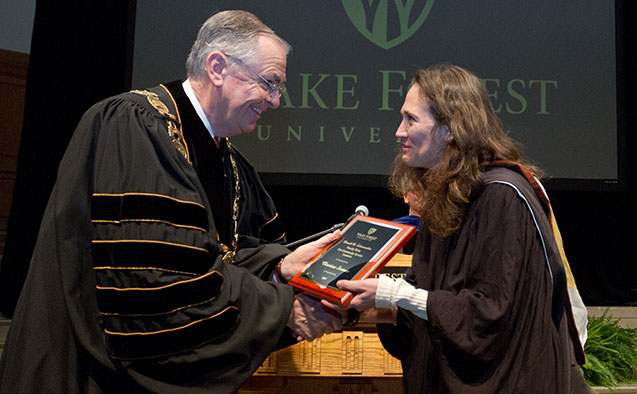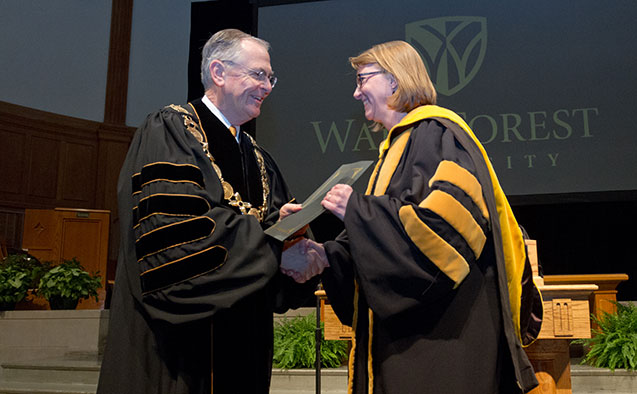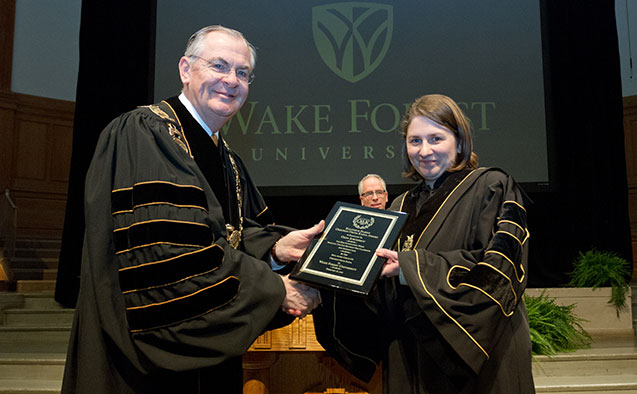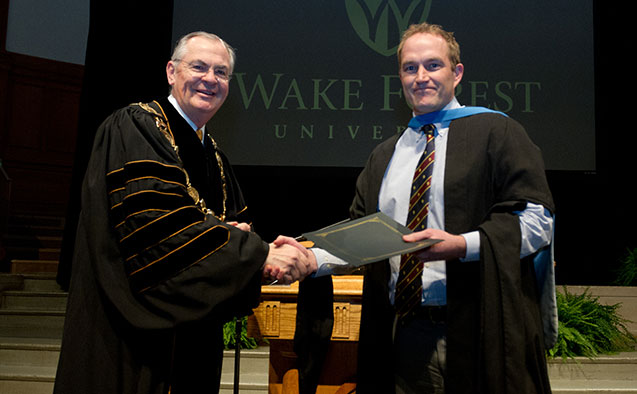Founders’ Day program honors seniors and faculty
The Wake Forest community commemorated 183 years since the University’s founding at Founders’ Day Convocation in Wait Chapel on Feb. 16.
The celebration recognizes student leaders and honors faculty for teaching, research and service.
View the photo gallery.
Student Orations
Each year, three students are selected to deliver an oration on Founders’ Day that addresses how they have changed during their four years at Wake Forest.
The winners of the 2017 Senior Orations Competition are:
- Richard Caban-Cubero: “What are you?”
- Ashley Laughlin: “Your Wake Forest ‘I’”
- Cameron Silverglate: “I Hope You Dance”
Medallion of Merit
The University’s highest honor, the Medallion of Merit, is presented to individuals who have rendered distinguished service to the University, including past presidents, trustees, benefactors, alumni, and retired faculty and administrators. This year the honor was awarded to James Barefield and Herman Eure (PhD ‘74) for their outstanding contributions to Wake Forest.
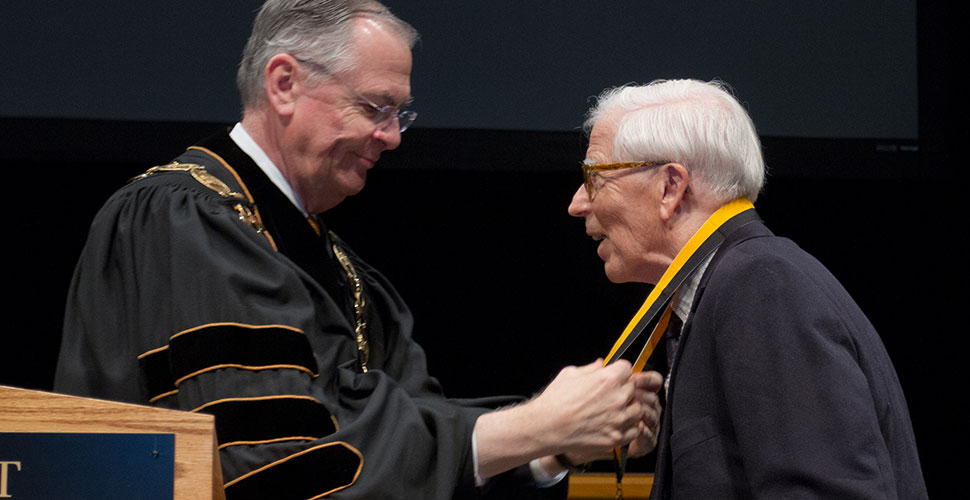
Throughout his 41-year teaching career at Wake Forest, history professor James Barefield was masterful at cultivating the student-teacher relationship, and his abiding concern for his students and their admiration and affection for him developed into numerous lifelong friendships. Barefield was known for his leadership in the study abroad and merit scholarship programs.
He supervised numerous semesters abroad at Casa Artom in Venice and London’s Worrell House, helping to build Wake Forest’s overseas studies program into the nationally recognized global studies program it is today. He supported merit scholarship opportunities as a mentor and advisor for undergraduate scholarship holders and for students competing for postgraduate scholarships like the Rhodes and the Fulbright. He retired from the faculty in 2004 and continues to serve the University as an interviewer for the admissions office.
Read more about Barefield: “Seriously funny” in Wake Forest Magazine.
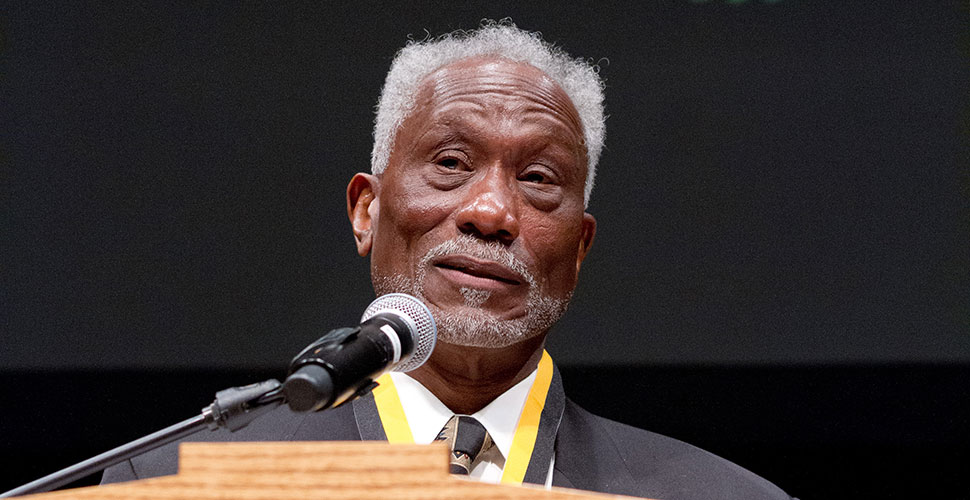
Biology professor Herman Eure has been an exemplary teacher-scholar and a pioneer in building an institution that promotes equality, inclusion and diversity. Eure earned his Ph.D. in biology at Wake Forest, becoming the first African-American graduate student on the Reynolda Campus, the first African-American to earn a doctorate at Wake Forest, and, in 1974 at age 27, one of the first African-Americans to join the faculty.
In 1978, he helped establish the Office of Minority Affairs, now the Intercultural Center, and later, he wrote the guidelines for the groundbreaking First Generation Student program, which evolved into today’s Magnolia Scholars program. Eure was awarded the Donald O. Schoonmaker Faculty Award for Community Service in 2011 and received the John Reinhardt Award for Distinguished Teaching in 2001.
Read more about Eure: “I was never afraid” in Wake Forest Magazine.
Faculty Honors and Awards
The URECA Faculty Award for Excellence in Mentorship in Research and Creative Work recognizes faculty members who engage Wake Forest undergraduates outside the classroom and inspire, guide and support the students’ intellectual and creative endeavors. The winners are Patricia Nixon and Stewart Carter.
Patricia Nixon, Department of Health and Exercise Science
Instrumental in designing the department’s three-tiered undergraduate research program, health and exercise science professor Pat Nixon has been actively involved in mentoring students since she arrived at Wake Forest in 1999. One of those students who asked her for support on his undergraduate research said, “When I approached Dr. Nixon and asked to work with her, I thought it would be a long shot, but what followed was without a doubt one of my most memorable experiences at Wake.” She continues to place her support for undergraduate research and her students at the highest priority.
Stewart Carter, Department of Music
Since 1982, music professor Stewart Carter has inspired both students and colleagues. One colleague described him as a “model of how to gracefully combine scholarship, service, teaching and mentorship.” He manages to maintain an impressive publication record while serving as department chair and generously spending many hours fostering student research. One of his students said, “He offers sage advice on how to craft a coherent argument from Latin texts, historical anecdotes, musical analyses and poetic texts.” Carter’s generosity of spirit has benefited both students and faculty.
The Award for Excellence in Research is presented annually to a member of the faculty who is an outstanding scholar at an early stage of his or her career. The winner is chemistry professor Amanda Jones.
Amanda Jones’s research in gold organic chemistry is internationally recognized. She received a 5-year NSF CAREER Award for this project — the highest national funding award that a young scientist can achieve. Jones works to make her research topics accessible to all students, both those at Wake Forest and those at middle and high schools in our community.
The Donald O. Schoonmaker Faculty Award for Community Service recognizes extraordinary community service by a faculty member. This winner is dance professor Christina Soriano.
Four years ago, Christina Soriano launched a small outreach dance project for individuals with Parkinson’s disease. The improvisational dance class is helping improve mobility for people with Parkinson’s, Alzheimer’s and dementia. Two scientific studies from the class have shed light on the importance of mobility and balance for people who are aging.
The Jon Reinhardt Award for Distinguished Teaching recognizes an experienced faculty member who exemplifies the ideals of a liberal arts education. The winner is biology professor Gloria Muday.
Gloria Muday is a leader in Wake Forest’s biochemistry, cell biology and molecular biology classrooms. She is also being recognized for her work with undergraduates who conduct research in her lab. Former students praise her for developing their skills in research and critical thinking by “gently steering” them in productive directions. Muday helps her students bring their projects to fruition and then encourages them to present their results to the broader scientific community.
The Joseph Branch Excellence in Teaching Award is presented to a member of the School of Law who exemplifies teaching and service to the legal profession. The winner is professor Shannon Gilreath.
Shannon Gilreath has written five books and numerous articles on issues of gender equality, sexual minorities, and constitutional interpretation. He regularly teaches Constitutional Law, Sexual Identity and Law, Freedom of Religion, and Gender and the Law.
The Kulynych Family Omicron Delta Kappa Award recognizes an outstanding faculty member who bridges the gap between classroom and student life. The winner is physics professor Oana Jurchescu.
Oana Jurchescu engages undergraduates in coursework and introduces them to practical research exploration. In her well-established research program focused on organic electronics, she has inspired many students to pursue graduate research. One student writes, “she is invested not only in students research and academic futures, but also in our personal wellbeing.”
The Reid-Doyle Prize for Excellence in Teaching is awarded to outstanding faculty members in the early part of their careers. The winner is classical languages professor Michael Sloan.
Michael Sloan demonstrates a love of the classical world and a commitment to his student’s well-being. He hosts at least one student for lunch every week. Students report that he not only makes sure the material is learned but that it is applied to their world views.

